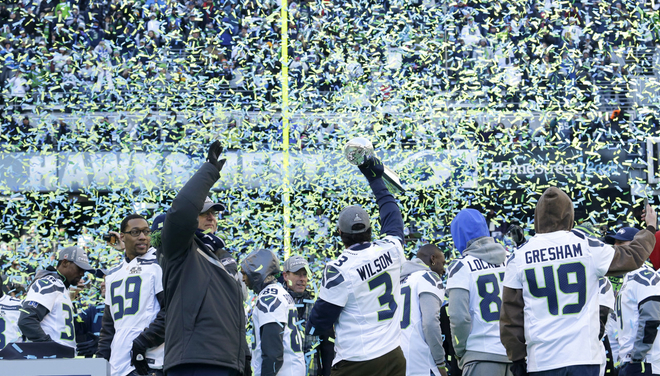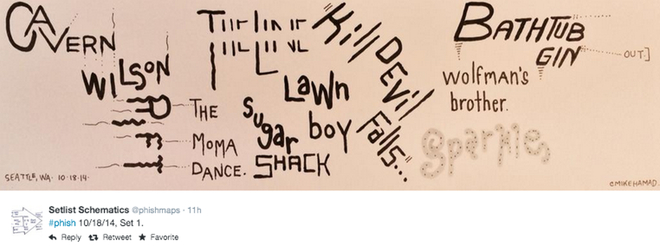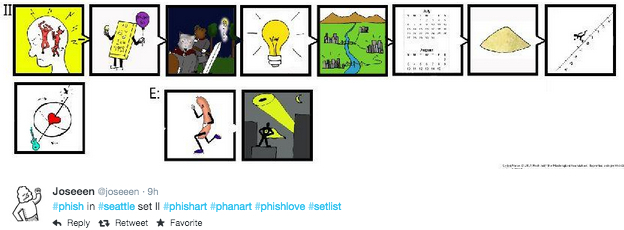BLOG POSTS WHERE MONTH IS 10, AND DAY IS 19, AND YEAR IS 2014
RECAP: BACK IN THE SEATTLE AGAIN
Part 1: A Brief History of Being a Phish Fan in Seattle
In the early 90s, I was living in southern New Mexico attending graduate school. The conservative town was a bad fit for me, so I was looking for an escape. The chilly mist of the Pacific Northwest seemed to be about as far of an escape from the fiery Mesilla Valley desert, so cars were loaded, apartments were found, and jobs were located. If there was one thing I was worried about, it was not the lack of Phish. The year before I moved, Phish played two northwest runs. 1995 had one in October. We were able to give thanks in 1996 with a Tofurkey Eve Key Arena show. No, we weren’t receiving the dozens of shows that a New Yorker gets, but it wasn’t bad at all for being tucked away in the northwest corner of the country.

Then came The Gorge. Phish played the amphitheater in 1997. The venue was amazing. It was a little annoying to have only two shows all year in our region, but seeing Phish in an environment like that more than made up for it. 1998 and 1999 had a return to The Gorge as part of a more extended tour of the region – but, of course, sans Emerald City – but then after the hiatus we moved into the current pattern. Every other year Phish would play a two-night run in George, WA and then move on to other parts of the country. No one could blame Phish for doing so. If I were in a band and I could play against the backdrop of the Columbia River carving a canyon through basalt, of a land so desolate that you can’t see signs that humans inhabit the planet on the other side of the stage, I would most definitely do the same. It’s one of the most amazing places to see music in the world. The only problem is that – at 160 miles away and over a mountain pass – it’s not somewhere where you can see Phish and also sleep in your bed. It’s local and exciting, but not the same as an actual in town show.
Part 2: A Brief History of Being a Seattle Sports Fan
What’s the history? Pain. The Seattle Mariners are one of only two teams in Major League Baseball that have never even played in the World Series. The Seattle Seahawks have had more luck recently, but prior to 2013 had but one Super Bowl appearance, one in which dropped passes, a few questionable time management moments, and a series of increasingly bizarre calls, missed to the point where the referee actually later apologized, ruined their chances. The SuperSonics won an NBA title in the 1970s but then were bought by an owner who immediately worked to poison the team’s relationship with the community in order to make sure his insane arena demands would be rejected so he could move them to his home town. This isn’t to say that there haven’t been moments of joy and wonder, but – just like a hometown show – the ultimate prize has never really been attained.

Part 3: Joining Forces
At a Trey solo show in Seattle last spring, the guitarist mentioned the Seahawks’ new quarterback Russell Wilson and how it would be cool if the team played Phish’s “Wilson” chant for the fans to do. At the end of his speech he said, “Guaranteed Super Bowl.” This is something that I also have always wanted. I sent a letter to the Mariners back in the 90s asking that Dan Wilson have “Wilson” for this walkup music, a letter that received no response whatsoever. This gained some traction though. First in preseason, and then during the season, the chant could be heard. Random references to it could be seen throughout the city. School marquees said, “Ba-bump, ba-bump WILSON.” The Seattle Great Wheel and the town’s mayor tweeted videos that featured the song. Phish were featured in an NFL Films production. My team, my band, and it was ridden to a championship. Without question, this was the best year of my life as a Phish and sports fan. Not only did I attend my first ever victory parade, but I did so with my favorite band as a soundtrack to the event. How could it be any better?
Part 4: The Reward
After an all east coast summer, the fall tour was announced, and there it sat. October 18, Key Arena, Seattle, WA. Phish would come here for the first time in 18 years. It would be not just a long awaited return but a celebration of all things that happened last year. What could mar this?
The day before the Seattle show, Phish played Eugene, OR. While driving there, my phone suddenly lit up with messages. Percy Harvin – an explosive player who helped seal the victory the year before but didn’t seem to be clicking this year– was suddenly traded for very little. The Seattle sports world suddenly moved from party time to confusion. Maybe that would work itself out, but Phish were still playing the Key. Phish fans would be hanging out by the Space Needle, and the International Fountain. This is a big deal!
A few minutes past eight, lights went out. The band came on stage, perhaps to play the “Wilson” to end all versions, but not to start. We’d first have a “Cavern” interlude, but then it came. I was thinking of all of the things that I would do if I were Trey in that moment. Maybe I’d license a few Russell Wilson highlights and we’d hear Steve Raible’s voice over the PA. Perhaps I’d sprinkle a few further playings of the riff throughout the night. Nothing like that happened. The crowd chanted, people were excited, but, quite surprisingly, Trey didn’t even mention the team or make any comment at all throughout the song. It was put out there, but just as something that happened, not as the big deal that the song and the team represented.

With the expected highlight of the night not being one, that did free up some room for the rest of the set. “Moma Dance,” while still played close to its 3.0 norm, showed a few signs that the band was willing to open it up a little, to play some subtle variations on the theme and keep it interesting. “Lawn Boy” had a few extra antics from Page as he played up his Vegas lounge act for all it was worth. Trey not only nailed the riff in “Sugar Shack,” a progression that has been a rough spot for him over the years, but he felt confident enough to play around with the theme. “Wolfman’s Brother” hit a nice peak. The set closing “Bathtub Gin” had an even better one, an intense finale that got the blood pumping and the crowd dancing. The first set might not have been one for the ages, but it was definitely fun.

After a short break, Phish came out again and referenced the last Seattle show. The earlier Key Arena night had a show opening “Down with Disease,” one that was incredibly strong. When they did the same in 2014, once again a Seattle fan’s mind was thinking about repeating. The jam started out strong and then found a funky space. Page was adding a few beautiful fills. A spacey element was introduced. At the point where things were shaping up so nicely, they moved into “Golden Age.”
Initial disappointment over the end of the jam couldn’t last too long. It’s a fun cover, and hearing Trey suggest that the return to Seattle after such a long gap meant that we were in the right place was very nice, and – again – this song leads to a jam. It got weird and spacey and showed a lot of promise, but again was quickly abandoned, this time for “Fuego.”
“Fuego” versions from the summer were mixed. Some extended out to long jams, others were played more close to the vest. This one was less of a Fuego and more of a Prius as it took a hybrid approach. The final chorus was never sung as another intriguing space jam was formed. This one was given a little more room to breathe, but again perhaps ended a tad soon as “Light” started.
The fast funk jam that followed led to somewhere interesting. For the second straight night, Phish covered a Talking Heads song and once again turned the tempo away from their usual pace and closer to the original. Eugene’s “Crosseyed and Painless” was slowed down and Seattle’s “Cities” was sped up. It was an interesting take for Phish, hearing them play the song like that. It wasn’t as fast at the original – or Mike’s solo versions – but showed something different, improvisation that didn’t come out of a jam but instead from an arrangement choice.
If the night could be said to have a theme, it perhaps was made clear during the “Sand.” One of Phish’s strengths of the past few years was to be able create these uplifting jams of effortless beauty. They’d built and penetrate your mind and soul and body and make it impossible to do much else but dance euphorically. The “Sand” started that approach. Trey found an amazing riff. The rest of the band joined in. This was going to be it, the one moment of the night where the Key Arena totally exploded. Just as it was getting there, “Backwards Down the Number Line” started up. And while it was a great version with a strong mid song break, it also pointed out what could have been.
Just like last year, Phish and the Seahawks’ had interweaving. Instead of the easy good times of 2013, this was a bit more frustrating. However, even if things weren’t quite working to full effect, there still were the glimpses and moments that pointed to brighter days to come. Not every day is going to be the best. Maybe this set will get few re-listens, but – much like the early season for the Hawks – there are hopeful signs that show that the better nights of this town have potential to be epic. Phish playing Seattle, fans taking over Seattle Center, some nice peaks and Phish playing some favorite songs – these are their own rewards.



 The Mockingbird Foundation
The Mockingbird Foundation